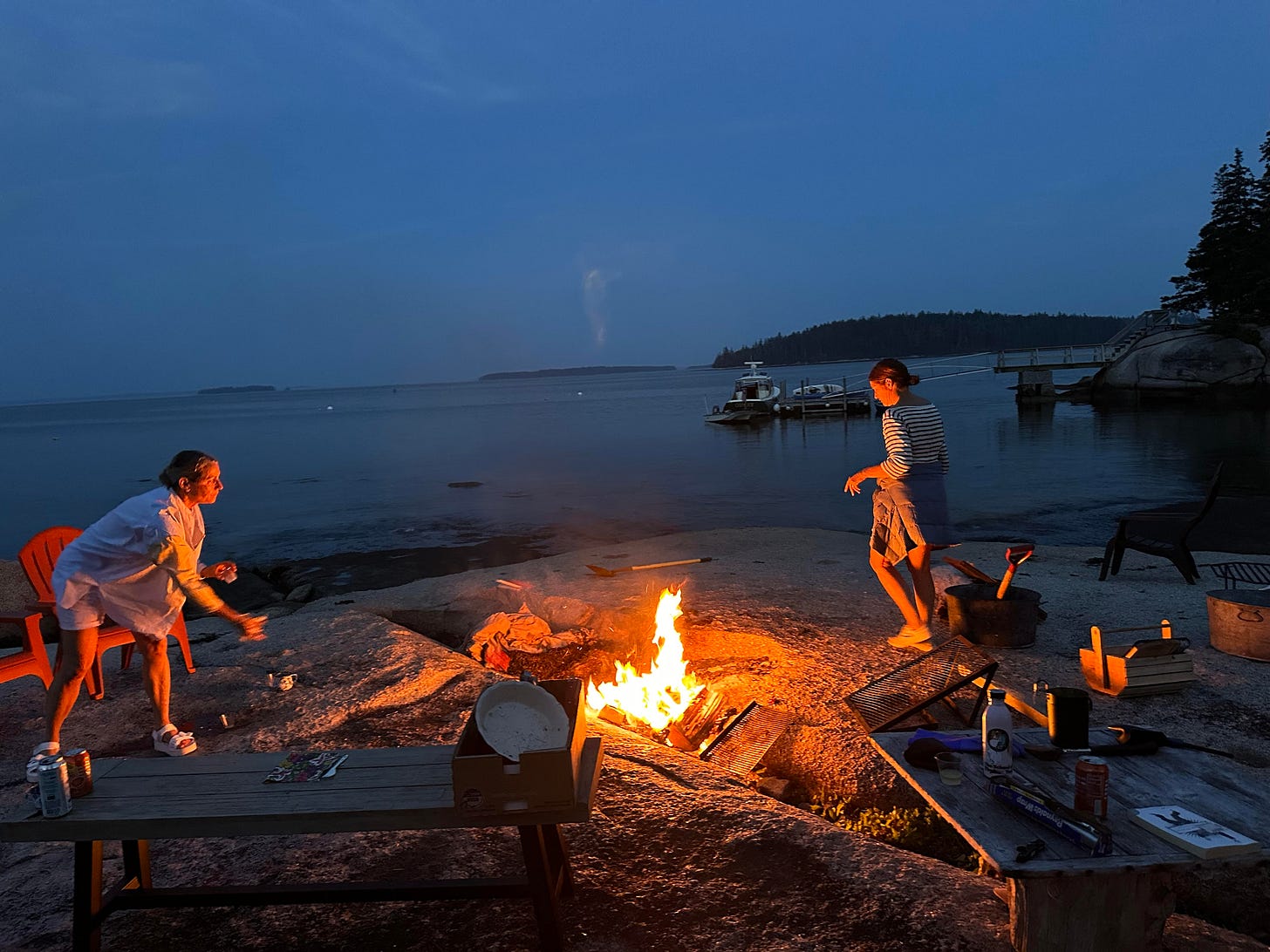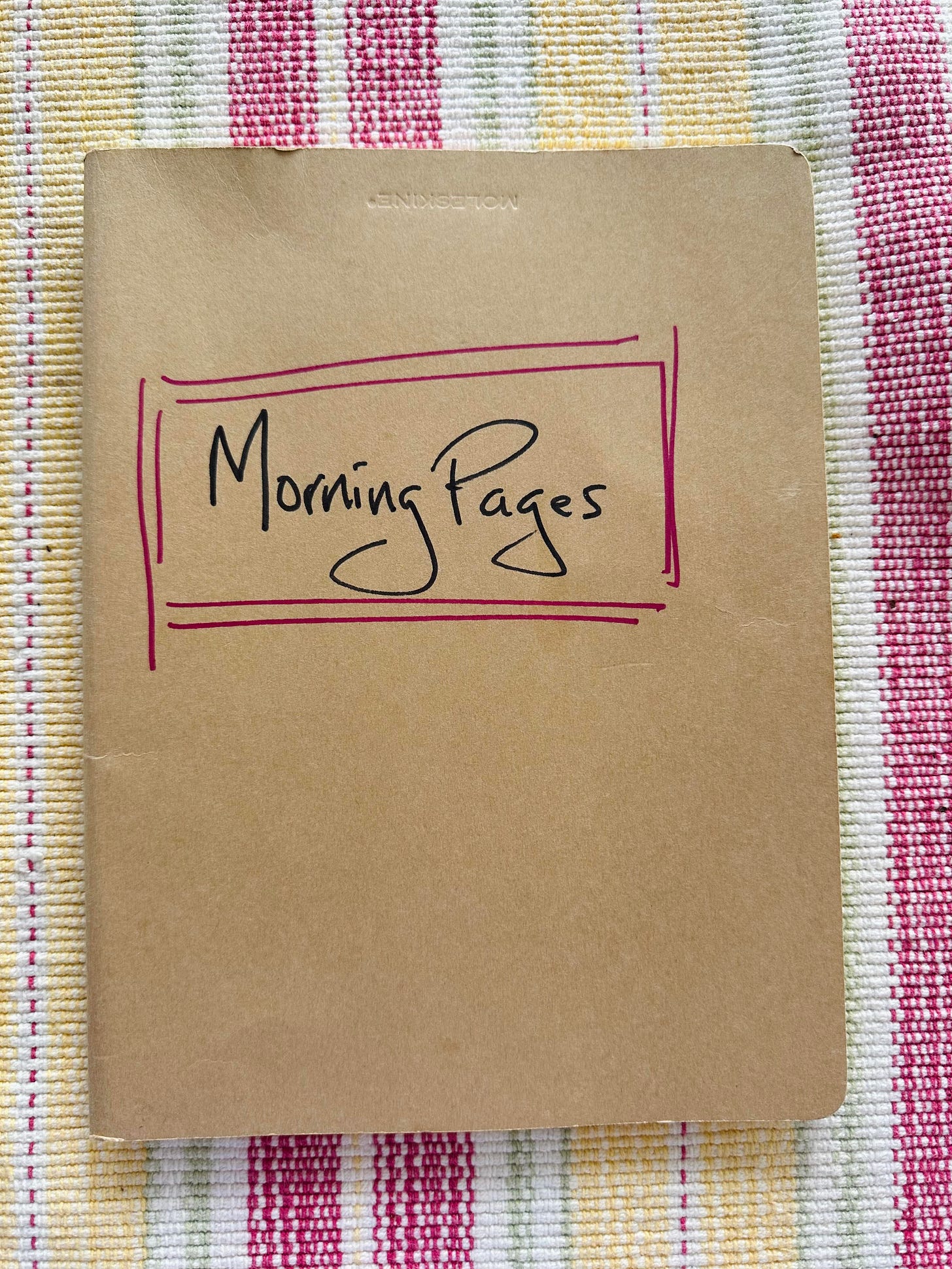Behind the scenes of a summer of writing
A glimpse into a disconnected life, summer depression, and writing through both
You can’t walk down Main Street in our beautiful coastal village1 in Maine without bumping into someone you know. If it’s someone I haven’t seen in a while, they’ll ask, “What are you up to this summer?” My response: “I’m writing a lot; I write a newsletter on Substack.” Not everyone is familiar with Substack so I try to add, “You know, like
,” but I usually forget. Their follow-up: “So what do you think of this weather? Sunny, foggy, and storms; it’s Maine, right?!” It’s as if the word “writing” doesn’t get through, as if the word can’t apply to a 72-year-old, retired grandmother. I know the weather is a more apt conversation topic for a brief sidewalk encounter than my writing, but still.This disconnect between my two lives, who I appear to be on the outside, and who I am this summer (a writer meeting a weekly deadline), is one reason for the summer blahs I’ve been feeling these past weeks. Heck, let’s call it what it is: summer depression. Seasonal depression in the warmer months is a real thing, for me, and for many other people, and while it sounds counter intuitive for depression to descend during long summer days, it’s quite common2. I’ve written about it a couple of times over the past decade3.

Two voices inside me
When I’m walking through the village, I hear two voices inside my head: one reminds me that my life is wonderful (blessed with family and friends, blah blah); the other cries out that I’m not being heard or seen. Depression chimes in, blaming me for such a petty complaint, chiding me for not being clearer with the people in my life about what I’m up to and why my topic of [b]old age is so important right now. I also hear my mother’s sharp voice telling me to hush up about all this; depression is shameful and should not be talked about publicly, and my writing isn’t important enough for folks to pay attention to, anyway.
Do I get a different response because I am a woman?
I sometimes wonder if friends and acquaintances would respond to my husband,
, the same way. I imagine that if he said, “I’m writing this summer!” the follow-up would be, “What about? Are you writing another book?” People would be more intrigued, at least enough to ask the standard follow-up rather than skip over it4.In addition to acquaintances I bump into, my close family also seems to be disinterested in my work on this newsletter. I know they’re very busy, but I wish my middle-age children5 would ask how the writing is going; they say nothing. I don’t seem to have the courage, or the right words, to ask them for feedback. Maybe they take my writing for granted and don’t feel they need to say anything. Ditto for Sam, but I wish I didn’t have to bug him to read the latest post.
Of course my own doubting voice plays a part in all this. Maybe this really is my fault. Without meaning to or wanting to, I’ve been slipping into the invisible identity of an older woman. I’m feeling cowardly and constricted. My own voice, amplified by the illogic of depression, is invalidating my own feelings and my experience of working on something important. But I want to be [b]older! I want to feel the kind of anger that makes you speak up for yourself, I want to tell this voice to shut up! So my depressive thinking, and my [b]oldness, go round and round.
Revelations from doing The Artist’s Way
Thankfully, there’s a bright spot amongst these doubts and conflicting thoughts. I’ve been working through Julia Cameron’s 12-week The Artist’s Way, her bestselling course and book on discovering or rediscovering creativity, with a group of
’s subscribers. I’ve done this course once before, on my own. To my surprise, this time I’m experiencing lightbulb moments.Anger is a map, Cameron says; it tells you what your boundaries are and shows you where you want to go. I’m realizing that my anger is telling me that maybe it’s okay to ask the people closest to me for feedback on my writing, rather than waiting for them to say something.
Take yourself on Artist Dates, she advises. They can be very simple (I focussed on the colors of all the blooming flowers when I took a walk), or more elaborate (I drove two hours away to see paintings by N.C. Wyeth, Andrew Wyeth, and Jamie Wyeth at the Farnsworth Art Museum in Rockland, ME.) Both times I felt my depression receding, and a sense of wonder and contentment replacing it.
And finally, the bedrock practice of The Artist’s Way, write three pages by hand every morning (these are the famous Morning Pages). This daily scribbling requires silencing my inner critic and allowing drivel to come out of my pen. Depressive thinking is constricting and black-and-white; this freeform writing has led me to think more flexibly and with more self-assurance about my life and my family and my identity as a writer.

Perhaps the most useful bit to come out of Morning Pages is the following script I could use to answer questions from well-meaning acquaintances. It goes something like this:
“In addition to enjoying the summer, I’m writing a newsletter on Substack. I publish weekly so it’s a lot of work. I write about [b]old age, which is relevant to me ha ha, but also to the moment we’re living in, with Biden and Trump. So it’s an important topic. I’d love it if you’d subscribe. It’s a Substack bestseller!”
Questions for readers
If you are writing on Substack, how do you describe your work to friends, family, and acquaintances?
Do you feel a disconnect between two versions of yourself?
I’m a resident of Stonington, ME, the lobster capital of Maine, which lands more pounds of lobster than any other port along the coast.
I am not talking about incapacitating, deep depression; rather, persistent, low-level depression known as dysthymia.
In 2014, I wrote When Depression Creeps in Like the Fog. In 2021, How I Cope with Summer Depression.
Sam is not writing this summer. Instead, he’s very involved with an affordable housing project here on Deer Isle.
Shortly after I posted this essay, my older daughter texted me, “I read your post! I validate you! You are a writer!” The exclamation points make this a little bit of a tease from her, but I loved the note nonetheless.
![[B]OLD AGE with Debbie Weil](https://substackcdn.com/image/fetch/$s_!i8Z0!,w_80,h_80,c_fill,f_auto,q_auto:good,fl_progressive:steep,g_auto/https%3A%2F%2Fsubstack-post-media.s3.amazonaws.com%2Fpublic%2Fimages%2Fdaaca764-d8d6-4a1b-bf58-61dbb72810fc_842x842.png)
![[B]OLD AGE with Debbie Weil](https://substackcdn.com/image/fetch/$s_!fEcd!,e_trim:10:white/e_trim:10:transparent/h_72,c_limit,f_auto,q_auto:good,fl_progressive:steep/https%3A%2F%2Fsubstack-post-media.s3.amazonaws.com%2Fpublic%2Fimages%2F95ad4442-e435-4ebc-a8d2-9c9b89a8bdb6_2100x400.png)

![[B]OLD AGE with Debbie Weil](https://substackcdn.com/image/fetch/$s_!i8Z0!,w_36,h_36,c_fill,f_auto,q_auto:good,fl_progressive:steep,g_auto/https%3A%2F%2Fsubstack-post-media.s3.amazonaws.com%2Fpublic%2Fimages%2Fdaaca764-d8d6-4a1b-bf58-61dbb72810fc_842x842.png)

Debbie, I too have suffered from depression and am sorry it has come for you. The question you raise about feedback on your writing has my mind all abuzz.
Writing is lonely work, and it's hard to shake the doubt that anyone cares. I'm on Substack largely for the pleasure of connecting with readers (many of them writers) who appreciate my work and recognize themselves in the stories I tell. Knowing I have readers who look forward to the next post means more than I can say. Then there are all the other people, family members and friends, whose interest in writing is tied to results: a new book getting buzz in the media and a place on bestseller lists. I don't expect them to understand why I write or to take much interest in what I've written. My husband has told me more than once that while he thinks I'm a "brilliant writer," I should stop writing memoir and turn my attention to something more marketable. I have friends who tells me, more than a year after they bought my book, that they haven't read it, as if they fear I am anxiously awaiting their comments. Maybe they'll get to it eventually. But I strongly suspect they won't. They cared enough to help by purchasing the book, but not enough to give it their reading time. I suspect most writers have such friends.
The feedback that keeps me going has to come from the right people, whose minds are attuned to my concerns as a writer. These people don't include my husband or my son. I have a small virtual circle of writer friends who enjoy reading work in progress and will cheer me on. I'm happy to do the same for them. Do you know writers you can ask to read an essay or meet for the occasional Zoom? I'm guessing that you do. And I am here to tell you that it helps.
Oh Debbie! We should be friends. I live in Vermont but visit Stonington most summers...for a week, too short, the place is magical! I imagine myself there through a winter of writing and staring at the foggy ocean. ❤️🦞
But that's not what you asked. I plug away at my newsletter, turning the dials to find an audience, frustrated that I care about progress as measured in numbers. (Still! At 62, measuring my worth by someone else's scale.) If my family reads it, they don't say much, except for my sister who never fails to support me. But my family, even my close friends, are not really the audience I want to reach. I write for a version of myself. The one who seeks, like you, to be [b]older!
P.S. This summer was tough for me. Too hot, too much. Too much self-pressure to write the damn book already, and a list of other projects as long as my arm. And, then, of course, the whole world. 😥I was glum, depressed as well, paralyzed. Digging myself out of it by literally cleaning out my files and folders, tossing out lists of what I should be doing, and asking this question every day in my morning pages: What life do you really want? ❤️☘️